9 aug 2014
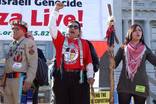
The parallels to the plight of the Palestinian people and Native Americans have been drawn by many. Speaking in San Francisco, Tony Gonzales of the American Indian Movement (AIM), ”with a common legacy of bantustans (homelands) – Indian reservations and encircled Palestinian territories – Native Americans understand well the situation of Palestinians.”
While there are certainly diverse views on nearly every political issue imaginable within Native American communities, a growing number are beginning to empathize with and see a disturbing parallel between what happened to the First Peoples of North America, and Palestinians in the Levant.
The Native American and Indigenous Studies Association made news back in December of 2013 for being one of three academic groups based in North America to endorse the Palestinian campaign for an academic and cultural boycott of Israel.
In January of 2013, the Jerusalem Post ran a telling article, entitled: “Native Americans turning on Israel?” The article focused on an anecdote of Muscogee Creek scholar and literary diva Joy Harjo, who ignited a “firestorm of controversy when she announced on Facebook that she was leaving for a trip to Israel where she was scheduled to perform.”
But most revealing was the article explaining just how much opposition there was within her Native community and others: opposition to her support for the Israeli State and its relationship with the Palestinian people.
Gyasi Ross, writing “Why I, as a Native American, support the Palestinian people,” explains the following:
As a Native person of this country, I’ve come to the conclusion that I must support the Palestinian people and the pursuit of an autonomous Palestinian state.
Although many view both Native Americans and Palestinians as “indigenous and displaced people,” this is not the reason that I feel a sense of kinship with Palestinians.
Instead, this fraternal feeling for my brothers and sisters in Gaza and on the West Bank is due to a much more basic and primal feeling of fear: the realization that what befalls one oppressed group inevitably befalls others.
Indigenous people, as well as other oppressed groups worldwide, regardless of race or religion, have a vested interest in learning from the genocidal atrocities that the U.S. government initiated on Native Americans. Every person who strives for humanity also has a strong interest in preventing those same atrocities from occurring in another place at another time to another group of people — in this particular situation, to the Palestinians.
Palestinians, like Natives, are captives in their own lands. They, too, have no place to go, no geographical recourse. Lebanon, Syria and Egypt have all shown their callousness to Palestinian people and have used them like human chess pieces against Israel.
Short on options, Palestinians, like Natives, have no choice but to continue to be a thorn in the side of the oftentimes apathetic and oppressive governments that have come to power by whatever means available.
Native American peace activists are becoming an increasingly visible presence at protests against the War in Gaza. For many, Ross’s words sum up the motivation and reasons for support.
While there are certainly diverse views on nearly every political issue imaginable within Native American communities, a growing number are beginning to empathize with and see a disturbing parallel between what happened to the First Peoples of North America, and Palestinians in the Levant.
The Native American and Indigenous Studies Association made news back in December of 2013 for being one of three academic groups based in North America to endorse the Palestinian campaign for an academic and cultural boycott of Israel.
In January of 2013, the Jerusalem Post ran a telling article, entitled: “Native Americans turning on Israel?” The article focused on an anecdote of Muscogee Creek scholar and literary diva Joy Harjo, who ignited a “firestorm of controversy when she announced on Facebook that she was leaving for a trip to Israel where she was scheduled to perform.”
But most revealing was the article explaining just how much opposition there was within her Native community and others: opposition to her support for the Israeli State and its relationship with the Palestinian people.
Gyasi Ross, writing “Why I, as a Native American, support the Palestinian people,” explains the following:
As a Native person of this country, I’ve come to the conclusion that I must support the Palestinian people and the pursuit of an autonomous Palestinian state.
Although many view both Native Americans and Palestinians as “indigenous and displaced people,” this is not the reason that I feel a sense of kinship with Palestinians.
Instead, this fraternal feeling for my brothers and sisters in Gaza and on the West Bank is due to a much more basic and primal feeling of fear: the realization that what befalls one oppressed group inevitably befalls others.
Indigenous people, as well as other oppressed groups worldwide, regardless of race or religion, have a vested interest in learning from the genocidal atrocities that the U.S. government initiated on Native Americans. Every person who strives for humanity also has a strong interest in preventing those same atrocities from occurring in another place at another time to another group of people — in this particular situation, to the Palestinians.
Palestinians, like Natives, are captives in their own lands. They, too, have no place to go, no geographical recourse. Lebanon, Syria and Egypt have all shown their callousness to Palestinian people and have used them like human chess pieces against Israel.
Short on options, Palestinians, like Natives, have no choice but to continue to be a thorn in the side of the oftentimes apathetic and oppressive governments that have come to power by whatever means available.
Native American peace activists are becoming an increasingly visible presence at protests against the War in Gaza. For many, Ross’s words sum up the motivation and reasons for support.
Joint declaration: France, Britain, Germany urge Gaza truce
France, Britain, and Germany on Saturday called on Israel and Hamas to agree on an immediate ceasefire in Gaza, according to a joint declaration from the three countries' foreign ministries.
"We call upon all parties immediately to return to a cease-fire. We fully support the ongoing efforts by Egypt to this end," said the statement from foreign ministers Laurent Fabius of France, Philip Hammond of Britain and Frank-Walter Steinmeier of Germany.
France, Britain, and Germany on Saturday called on Israel and Hamas to agree on an immediate ceasefire in Gaza, according to a joint declaration from the three countries' foreign ministries.
"We call upon all parties immediately to return to a cease-fire. We fully support the ongoing efforts by Egypt to this end," said the statement from foreign ministers Laurent Fabius of France, Philip Hammond of Britain and Frank-Walter Steinmeier of Germany.

A man cleans the inside of a room in his home as Palestinian emergency workers try to retrieve the body of a man killed when the mosque was targeted by an Israeli air strike, in Nuseirat in Gaza City on Aug. 9, 2014
Israeli airstrikes killed three Palestinians in the Gaza Strip late Saturday, a health ministry spokesman said.
Ashraf al-Qidra said warplanes targeted a group of people in Deir al-Balah, killing 37-year-old Mahmoud Muhammad al-Jourani.
Earlier, an airstrike hit a civilian car in the al-Barazil neighborhood in eastern Rafah, killing Said Atif Tamraz, 26, and Muhammad Adil al-Ayidi, 28.
Eight Palestinians have been killed by Israeli attacks on Saturday, as warplanes continue to target various sites across Gaza.
The latest deaths bring the number of Palestinians killed in Israel's 33-day offensive on Gaza to 1,914. Some 9,861 Palestinians have been injured throughout the assault, according to the Ministry of Health.
The United Nations says at least 1,354 of the dead were civilians, including 447 children.
Earlier Saturday, Israeli shelling injured five Palestinians in northern Gaza City, a Ma'an reporter said.
Before that, medics recovered the body of a Palestinian child in the Shujaiyya neighborhood of Gaza City.
An army statement said warplanes had carried out more than 100 strikes in Gaza since Friday morning, 49 of them on Saturday, targeting those responsible for the rocket fire.
The army said 23 rockets hit Israel, bringing to 61 the number of projectiles launched since a 72-hour truce ended on Friday.
'Awaiting Israeli response'
Israeli airstrikes killed three Palestinians in the Gaza Strip late Saturday, a health ministry spokesman said.
Ashraf al-Qidra said warplanes targeted a group of people in Deir al-Balah, killing 37-year-old Mahmoud Muhammad al-Jourani.
Earlier, an airstrike hit a civilian car in the al-Barazil neighborhood in eastern Rafah, killing Said Atif Tamraz, 26, and Muhammad Adil al-Ayidi, 28.
Eight Palestinians have been killed by Israeli attacks on Saturday, as warplanes continue to target various sites across Gaza.
The latest deaths bring the number of Palestinians killed in Israel's 33-day offensive on Gaza to 1,914. Some 9,861 Palestinians have been injured throughout the assault, according to the Ministry of Health.
The United Nations says at least 1,354 of the dead were civilians, including 447 children.
Earlier Saturday, Israeli shelling injured five Palestinians in northern Gaza City, a Ma'an reporter said.
Before that, medics recovered the body of a Palestinian child in the Shujaiyya neighborhood of Gaza City.
An army statement said warplanes had carried out more than 100 strikes in Gaza since Friday morning, 49 of them on Saturday, targeting those responsible for the rocket fire.
The army said 23 rockets hit Israel, bringing to 61 the number of projectiles launched since a 72-hour truce ended on Friday.
'Awaiting Israeli response'
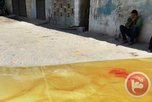
A Palestinian man laments in silence as he leans on a wall of a morgue where the body of his relative was brought after he was pulled from under the rubble of a mosque in Gaza City on Aug. 9, 2014
Meanwhile, negotiations were ongoing, as the Palestinian delegation said it was still awaiting Israel's response to its demands.
Though Israel recalled its delegation Friday, warning it would not negotiate under fire, the Israelis were still communicating with the Egyptian mediators over the phone, a Palestinian delegation leader told Ma'an.
Bassam al-Salihi said the delegation was "waiting for an Israeli response," which would determine whether the negotiations would proceed.
He added that the issue of Rafah crossing would be left as a Palestinian-Egyptian matter, and that the Israeli delegation would not engage in talks regarding the crossing.
A Palestinian source close to the talks told AFP that the Israeli delegation was to return for negotiations late Saturday.
Earlier, another Palestinian official said on condition of anonymity that Egypt and the Palestinians had reached a draft agreement for submission to Israel on Saturday.
It would see Egypt and the Palestinian Authority take control of the Rafah border crossing into Egypt, essentially activating part a unity accord Hamas signed with the PA in April.
Negotiations on the sea port, demanded by Hamas, would then be delayed and entrusted to the PA, with whom Israel is prepared to deal.
Palestinian factions have insisted that Israel end its eight-year siege on the Gaza Strip, release dozens of prisoners whom Israel has re-arrested that were released in 2011 as part of the Shalit exchange, re-open a seaport and airport in Gaza, and create a safe passage between the West Bank and the Gaza Strip.
Clashes in West Bank, worldwide solidarity
In the occupied West Bank, 15 Palestinian youths were injured in clashes with Israeli troops, who used rubber bullets and live fire to disperse stone throwers in the town of Hebron, medics told AFP.
The trouble broke out after the funeral of a Palestinian man shot dead by Israeli troops during protests against the Gaza operation on Friday, witnesses said.
Similar clashes also erupted in Ramallah. Israeli troops responded with tear gas and stun grenades.
In London, up to 150,000 protesters packed Oxford Street, marching to the US embassy and on to Hyde Park, many of them chanting "Free, Free Palestine" and holding up banners saying "UK - Stop Arming Israel."
Tens of thousands of demonstrators also marched through Cape Town to protest the Israeli military operation, one of the biggest rallies in the city since the end of apartheid.
Demonstrators carried placards stating "Israel is an apartheid state" and "Stop Israeli murder."
Meanwhile, negotiations were ongoing, as the Palestinian delegation said it was still awaiting Israel's response to its demands.
Though Israel recalled its delegation Friday, warning it would not negotiate under fire, the Israelis were still communicating with the Egyptian mediators over the phone, a Palestinian delegation leader told Ma'an.
Bassam al-Salihi said the delegation was "waiting for an Israeli response," which would determine whether the negotiations would proceed.
He added that the issue of Rafah crossing would be left as a Palestinian-Egyptian matter, and that the Israeli delegation would not engage in talks regarding the crossing.
A Palestinian source close to the talks told AFP that the Israeli delegation was to return for negotiations late Saturday.
Earlier, another Palestinian official said on condition of anonymity that Egypt and the Palestinians had reached a draft agreement for submission to Israel on Saturday.
It would see Egypt and the Palestinian Authority take control of the Rafah border crossing into Egypt, essentially activating part a unity accord Hamas signed with the PA in April.
Negotiations on the sea port, demanded by Hamas, would then be delayed and entrusted to the PA, with whom Israel is prepared to deal.
Palestinian factions have insisted that Israel end its eight-year siege on the Gaza Strip, release dozens of prisoners whom Israel has re-arrested that were released in 2011 as part of the Shalit exchange, re-open a seaport and airport in Gaza, and create a safe passage between the West Bank and the Gaza Strip.
Clashes in West Bank, worldwide solidarity
In the occupied West Bank, 15 Palestinian youths were injured in clashes with Israeli troops, who used rubber bullets and live fire to disperse stone throwers in the town of Hebron, medics told AFP.
The trouble broke out after the funeral of a Palestinian man shot dead by Israeli troops during protests against the Gaza operation on Friday, witnesses said.
Similar clashes also erupted in Ramallah. Israeli troops responded with tear gas and stun grenades.
In London, up to 150,000 protesters packed Oxford Street, marching to the US embassy and on to Hyde Park, many of them chanting "Free, Free Palestine" and holding up banners saying "UK - Stop Arming Israel."
Tens of thousands of demonstrators also marched through Cape Town to protest the Israeli military operation, one of the biggest rallies in the city since the end of apartheid.
Demonstrators carried placards stating "Israel is an apartheid state" and "Stop Israeli murder."
Israeli warplanes bomb cemetery in central Gaza City
Israeli warplanes bombed Sheikh Radwan cemetery in central Gaza City late Saturday, a Ma'an reporter said.
There were no immediate reports of injuries.
Israeli warplanes bombed Sheikh Radwan cemetery in central Gaza City late Saturday, a Ma'an reporter said.
There were no immediate reports of injuries.
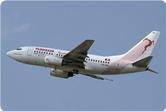
A Tunisian plane, loaded with 14 tons of medical supplies and food items for Gaza, took off from Carthage Airport on Friday evening heading for Egypt. The Tunisian authorities had already flown last month 16 tons of medical and food supplies to Gaza through Egypt.
The transfer of aid supplies for Gaza take place under the supervision of the Tunisian presidency and is supported by the Tunisian association for cooperation and social networking and the Tunisian Red Cross.
A pro-Gaza celebration rally was held by The Tunisian trade union on Friday in protest at the Israeli war on Gaza.
Speakers at the rally called on the international community, the UN, the security council and the world's pro-Palestinian pressure groups to work on ensuring a permanent ceasefire in Gaza and curbing Israel's crimes against the civilians in Gaza.
In a related context, Turkish PM Recep Tayyip Erdogan said his country is ready to provide urgent physical and psychological treatment for all the Palestinian victims who have been wounded in the massive Israeli attacks launched for more than a month in Gaza.
"In case our efforts being made in this regard work out, we will start immediately to evacuate the wounded casualties to our hospitals in Anakara and Istanbul" Erdogan stated.
The transfer of aid supplies for Gaza take place under the supervision of the Tunisian presidency and is supported by the Tunisian association for cooperation and social networking and the Tunisian Red Cross.
A pro-Gaza celebration rally was held by The Tunisian trade union on Friday in protest at the Israeli war on Gaza.
Speakers at the rally called on the international community, the UN, the security council and the world's pro-Palestinian pressure groups to work on ensuring a permanent ceasefire in Gaza and curbing Israel's crimes against the civilians in Gaza.
In a related context, Turkish PM Recep Tayyip Erdogan said his country is ready to provide urgent physical and psychological treatment for all the Palestinian victims who have been wounded in the massive Israeli attacks launched for more than a month in Gaza.
"In case our efforts being made in this regard work out, we will start immediately to evacuate the wounded casualties to our hospitals in Anakara and Istanbul" Erdogan stated.
5 injured in Israeli shelling on northern Gaza City
Five Palestinians were injured in an Israeli shelling on northern Gaza City on Saturday, a Ma'an reporter said.
Five Palestinians were injured in an Israeli shelling on northern Gaza City on Saturday, a Ma'an reporter said.
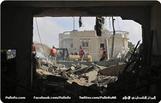
Israeli warplanes bombed on Saturday morning three mosques and a number of civilian homes throughout the Gaza Strip.
Quds Press confirmed that Israeli F16 fighter jets have targeted in the early morning hours three mosques in the Gaza Strip, causing considerable damage to the surrounding areas.
Saturday’s airstrikes raised the number of mosques destroyed since the start of Israeli aggression to 64, while 150 others were partially destroyed.
Israeli warplanes and tanks also targeted Al-Nada residential towers to the north of the Strip, while violent artillery attacks took place on al-Bureij refugee camp and Deir al-Balah district.
Moreover, around 25 airstrikes targeted this morning Palestinian resistance sites in Rafah and Khan Younis.
In other aerial attacks, three homes were bombed in Gaza City and in the north of the Strip.
Israeli warships also bombed the northern shores of Gaza. No casualties were reported during the attack
Quds Press confirmed that Israeli F16 fighter jets have targeted in the early morning hours three mosques in the Gaza Strip, causing considerable damage to the surrounding areas.
Saturday’s airstrikes raised the number of mosques destroyed since the start of Israeli aggression to 64, while 150 others were partially destroyed.
Israeli warplanes and tanks also targeted Al-Nada residential towers to the north of the Strip, while violent artillery attacks took place on al-Bureij refugee camp and Deir al-Balah district.
Moreover, around 25 airstrikes targeted this morning Palestinian resistance sites in Rafah and Khan Younis.
In other aerial attacks, three homes were bombed in Gaza City and in the north of the Strip.
Israeli warships also bombed the northern shores of Gaza. No casualties were reported during the attack
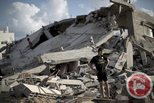
Medics recovered the body of a Palestinian child in the Shujaiyya neighborhood of Gaza on Saturday, a health official said.
The body brought the death toll of the Israel's 33-day offensive on the Strip to 1,904, with 9,837 injured, health ministry spokesman Ashraf al-Qidra said in a statement.
Israeli warplanes continued targeting various sites across Gaza Saturday, leaving five Palestinians dead on the second day after the end of a 72-hour ceasefire expired with long-term ceasefire negotiations in Cairo still at a standstill.
In the most recent Israeli attack, five Palestinians were injured in a shelling on northern Gaza City.
The Israeli army said Palestinian militants fired 14 rockets into Israel, bringing to 52 the number of projectiles launched at Israel since Friday.
The United Nations says at least 1,354 of the Palestinian dead are civilians, including 447 children.
Meanwhile, negotiations in Egypt continued, with the Hamas movement vowing that it would not let go of any of its demands from Israel for a permanent ceasefire deal.
"The occupier's intransigence will get it nowhere and we will make no concessions on the demands of our people," spokesman Fawzy Barhum said in a statement.
A spokesman for the military wing of the Popular Front for the Liberation of Palestine concurred.
"He who imposes their conditions are the winners," said Abu Jamal. "The resistance has the right to impose its terms and oblige the enemy to accept them."
Hamas and Palestine Liberation Organization officials have insisted that Israel end its eight-year siege on the Gaza Strip, release dozens of prisoners whom Israel has re-arrested that were released in 2011 as part of the Shalit exchange, re-open a seaport and airport in Gaza, and create a safe passage between the West Bank and the Gaza Strip.
A Palestinian official said on condition of anonymity Egypt and the Palestinians had reached a draft agreement for submission to Israel on Saturday.
It would see Egypt and the Palestinian Authority take control of the Rafah border crossing into Egypt, in which Hamas would essentially activate a unity deal signed with the PA in April.
Negotiations on the sea port, demanded by Hamas, would then be delayed and entrusted to the PA, with whom Israel is prepared to deal.
'Intolerable' conditions in Gaza
Meanwhile, Palestinian member of parliament Mustafa Barghouti was visiting Gaza, and spoke to Ma'an about the "intolerable" conditions there.
"As the battle continues, hospitals across the Strip are suffering from from serious shortages in medicines and medical equipment which can't be brought easily into Gaza given the Israeli restrictions and the closure of Gaza crossings," Barghouti said.
"There aren't enough hospital beds and morgues in the Gaza Strip to cope with the large numbers of deaths and injuries," he said.
The offensive has severely damaged Gaza's infrastructure, Barghouti added.
"The people of Gaza Strip are facing serious health threats ... after water and sewage networks across the coastal enclave were destroyed. Sewage is now running in the streets and reaching the sea."
Chris Gunness, spokesman for the UN agency for Palestinian refugees UNRWA, called for the Gaza blockade to end so enable reconstruction could begin.
"Huge swathes of Gaza have been leveled. We cannot rebuild it with our hands tied behind our backs," he said. "The blockade must end. ... All those directly and indirectly responsible for the carnage and destruction must engage," he added.
At least 65,000 people have had their homes destroyed, and UNRWA said 222,000 people are still sheltering in 89 UN schools.
US-based Human Rights Watch said the knocking out of Gaza's only electrical power plant, by apparent Israeli shellfire, has worsened the humanitarian crisis.
The body brought the death toll of the Israel's 33-day offensive on the Strip to 1,904, with 9,837 injured, health ministry spokesman Ashraf al-Qidra said in a statement.
Israeli warplanes continued targeting various sites across Gaza Saturday, leaving five Palestinians dead on the second day after the end of a 72-hour ceasefire expired with long-term ceasefire negotiations in Cairo still at a standstill.
In the most recent Israeli attack, five Palestinians were injured in a shelling on northern Gaza City.
The Israeli army said Palestinian militants fired 14 rockets into Israel, bringing to 52 the number of projectiles launched at Israel since Friday.
The United Nations says at least 1,354 of the Palestinian dead are civilians, including 447 children.
Meanwhile, negotiations in Egypt continued, with the Hamas movement vowing that it would not let go of any of its demands from Israel for a permanent ceasefire deal.
"The occupier's intransigence will get it nowhere and we will make no concessions on the demands of our people," spokesman Fawzy Barhum said in a statement.
A spokesman for the military wing of the Popular Front for the Liberation of Palestine concurred.
"He who imposes their conditions are the winners," said Abu Jamal. "The resistance has the right to impose its terms and oblige the enemy to accept them."
Hamas and Palestine Liberation Organization officials have insisted that Israel end its eight-year siege on the Gaza Strip, release dozens of prisoners whom Israel has re-arrested that were released in 2011 as part of the Shalit exchange, re-open a seaport and airport in Gaza, and create a safe passage between the West Bank and the Gaza Strip.
A Palestinian official said on condition of anonymity Egypt and the Palestinians had reached a draft agreement for submission to Israel on Saturday.
It would see Egypt and the Palestinian Authority take control of the Rafah border crossing into Egypt, in which Hamas would essentially activate a unity deal signed with the PA in April.
Negotiations on the sea port, demanded by Hamas, would then be delayed and entrusted to the PA, with whom Israel is prepared to deal.
'Intolerable' conditions in Gaza
Meanwhile, Palestinian member of parliament Mustafa Barghouti was visiting Gaza, and spoke to Ma'an about the "intolerable" conditions there.
"As the battle continues, hospitals across the Strip are suffering from from serious shortages in medicines and medical equipment which can't be brought easily into Gaza given the Israeli restrictions and the closure of Gaza crossings," Barghouti said.
"There aren't enough hospital beds and morgues in the Gaza Strip to cope with the large numbers of deaths and injuries," he said.
The offensive has severely damaged Gaza's infrastructure, Barghouti added.
"The people of Gaza Strip are facing serious health threats ... after water and sewage networks across the coastal enclave were destroyed. Sewage is now running in the streets and reaching the sea."
Chris Gunness, spokesman for the UN agency for Palestinian refugees UNRWA, called for the Gaza blockade to end so enable reconstruction could begin.
"Huge swathes of Gaza have been leveled. We cannot rebuild it with our hands tied behind our backs," he said. "The blockade must end. ... All those directly and indirectly responsible for the carnage and destruction must engage," he added.
At least 65,000 people have had their homes destroyed, and UNRWA said 222,000 people are still sheltering in 89 UN schools.
US-based Human Rights Watch said the knocking out of Gaza's only electrical power plant, by apparent Israeli shellfire, has worsened the humanitarian crisis.
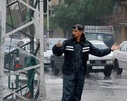
Gaza's most famous traffic policeman Muhammad al-Mubayyid was killed during the recent Israeli assault as he tried to save his grandmother from her home, Gaza police said Saturday.
Gaza police spokesman Ayman al-Batneiji told Ma'an that al-Mubayyid was one of the most active traffic policemen on the force, and used to stand guard at the most crowded squares in Gaza City, al-Saraya and al-Ittisalat.
Al-Batneiji said that he was a Gaza City landmark, and almost every driver in the city remembered him.
Gaza police spokesman Ayman al-Batneiji told Ma'an that al-Mubayyid was one of the most active traffic policemen on the force, and used to stand guard at the most crowded squares in Gaza City, al-Saraya and al-Ittisalat.
Al-Batneiji said that he was a Gaza City landmark, and almost every driver in the city remembered him.
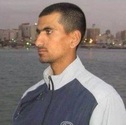
Al-Mubayyid was killed in Israeli shelling after most of his family had fled their home in al-Shaaf in Shujaiyya, one of the hardest-hit neighborhoods in Gaza.
After he had escorted family members to a shelter outside the neighborhood, he returned to check on his grandmother, who had refused to leave her home.
It was there that the Israeli shell struck, killing both of them together in her apartment. The building was completely leveled in the strike, which occurred on July 21.
The strike came amid a major Israeli onslaught on the neighborhood, which killed more than 100 in less than two days.
Al-Mubayyid was also a soccer player at the Hitten sports club.
After he had escorted family members to a shelter outside the neighborhood, he returned to check on his grandmother, who had refused to leave her home.
It was there that the Israeli shell struck, killing both of them together in her apartment. The building was completely leveled in the strike, which occurred on July 21.
The strike came amid a major Israeli onslaught on the neighborhood, which killed more than 100 in less than two days.
Al-Mubayyid was also a soccer player at the Hitten sports club.
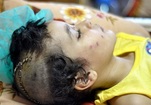
Child Injured
The Palestinian Ministry Of Health stated that five Palestinians were killed, and several others injured, some seriously, after the army bombarded a mosque in Nusseirat area, and the al-Maghazi refugee camp, in Central Gaza. The Ministry said resident Moath Azzam Abu Zeid, 37, died under the rubble of the al-Qassam Mosque in Nusseirat.
His remains and a number of wounded Palestinians have been moved to the al-Aqsa Hospital.
Rescue teams continued the search under rubble, and located the remains of two Palestinians, identified as Nidal Mohammad Badran, 34, and Tareq Ziad Jadallah, 25.
In addition, the Palestinian News & Info Agency (WAFA) stated that two Palestinians were killed, when the army fired a missile at a motorcycle rider, in the al-Maghazi refugee camp, in central Gaza.
They have been identified as Abdul-Hakim Suleiman al-Masdar, 56, and Mo’men Akram al-Masdar, 19.
The army also fired missiles into another mosque in the Nusseirat refugee camp, and a third mosque in Zeitoun neighborhood, south of Gaza City, destroying them, while a fourth mosque was damaged by an Israeli missile, also in Gaza City.
Updated From:
Two Seriously Injured In Gaza, 3 Mosques Destroyed Sat, 09 Aug 2014 10:19:54
The Israeli army bombarded on Saturday at dawn, and during morning hours, several areas in the Gaza Strip, seriously wounding two Palestinians, and destroying two mosques. The army also fired missiles into farmlands in the coastal region.
Medical sources in Khan Younis, in the southern part of the Gaza Strip, have reported that two Palestinians suffered serious injuries after the Israeli air force fired a missile into the az-Zanna area and Bani Soheila, east of Khan Younis.
The two were moved to the Nasser Medical Center in Khan Younis.
In addition, soldiers fired missiles into two mosques in the Nusseirat refugee camp, in central Gaza, and a third mosque in Zietoun neighborhood, south of Gaza City, completely destroying them, while a fourth mosque was damaged by an Israeli missile, also in Gaza City.
Israel bombarded more than 150 mosques in different parts of the coastal region since it launched its aggression on Gaza and its people, on July 8, 2014.
In related news, the army fired missiles into several homes, a youth club, farmlands, and a neighborhood in the al-Maghazi refugee camp, in Central Gaza.
Several Israeli missiles also targeted eastern neighborhoods of Gaza City, especially Zeitoun, Shuja’eyya, Jabal ar-Rayyis area, and at-Tuffah, while more missiles were fired into Ezbet Abed-Rabbo, east of Jabalia, in the northern part of the coastal region.
Israel drones and war jets are still flying over different parts of the Gaza Strip.
The Ministry of Health in Gaza stated on Saturday at dawn, the 1899 Palestinians have been killed, and Israeli missiles and shells have injured more than 9837 since July 8.
Rockets launched toward Eshkol and Sdot Negev
Rockets were launched toward Eshkol and Sdot Negev in southern Israel from Gaza on Saturday.
The Palestinian Ministry Of Health stated that five Palestinians were killed, and several others injured, some seriously, after the army bombarded a mosque in Nusseirat area, and the al-Maghazi refugee camp, in Central Gaza. The Ministry said resident Moath Azzam Abu Zeid, 37, died under the rubble of the al-Qassam Mosque in Nusseirat.
His remains and a number of wounded Palestinians have been moved to the al-Aqsa Hospital.
Rescue teams continued the search under rubble, and located the remains of two Palestinians, identified as Nidal Mohammad Badran, 34, and Tareq Ziad Jadallah, 25.
In addition, the Palestinian News & Info Agency (WAFA) stated that two Palestinians were killed, when the army fired a missile at a motorcycle rider, in the al-Maghazi refugee camp, in central Gaza.
They have been identified as Abdul-Hakim Suleiman al-Masdar, 56, and Mo’men Akram al-Masdar, 19.
The army also fired missiles into another mosque in the Nusseirat refugee camp, and a third mosque in Zeitoun neighborhood, south of Gaza City, destroying them, while a fourth mosque was damaged by an Israeli missile, also in Gaza City.
Updated From:
Two Seriously Injured In Gaza, 3 Mosques Destroyed Sat, 09 Aug 2014 10:19:54
The Israeli army bombarded on Saturday at dawn, and during morning hours, several areas in the Gaza Strip, seriously wounding two Palestinians, and destroying two mosques. The army also fired missiles into farmlands in the coastal region.
Medical sources in Khan Younis, in the southern part of the Gaza Strip, have reported that two Palestinians suffered serious injuries after the Israeli air force fired a missile into the az-Zanna area and Bani Soheila, east of Khan Younis.
The two were moved to the Nasser Medical Center in Khan Younis.
In addition, soldiers fired missiles into two mosques in the Nusseirat refugee camp, in central Gaza, and a third mosque in Zietoun neighborhood, south of Gaza City, completely destroying them, while a fourth mosque was damaged by an Israeli missile, also in Gaza City.
Israel bombarded more than 150 mosques in different parts of the coastal region since it launched its aggression on Gaza and its people, on July 8, 2014.
In related news, the army fired missiles into several homes, a youth club, farmlands, and a neighborhood in the al-Maghazi refugee camp, in Central Gaza.
Several Israeli missiles also targeted eastern neighborhoods of Gaza City, especially Zeitoun, Shuja’eyya, Jabal ar-Rayyis area, and at-Tuffah, while more missiles were fired into Ezbet Abed-Rabbo, east of Jabalia, in the northern part of the coastal region.
Israel drones and war jets are still flying over different parts of the Gaza Strip.
The Ministry of Health in Gaza stated on Saturday at dawn, the 1899 Palestinians have been killed, and Israeli missiles and shells have injured more than 9837 since July 8.
Rockets launched toward Eshkol and Sdot Negev
Rockets were launched toward Eshkol and Sdot Negev in southern Israel from Gaza on Saturday.
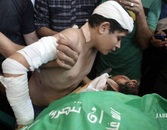
An elderly man and his grandson were killed in an Israeli strike on a motorcycle in Gaza City on Saturday, while Israeli warplanes continued to launch more air raids on other areas in the besieged Strip. Eyewitnesses told Quds Press that an Israeli strike targeted this morning a motorcycle near al-Maghazi refugee camp, which led to the killing of an elderly man and his grandson.
Israeli warplanes also bombed two civilian homes in Rafah and an agricultural land in Khan Younis. No casualties were reported during the attacks.
Palestinian medical sources had earlier revealed the identity of three bodies pulled from under the rubble of Izz al-Din al-Qassam Mosque, which was bombed in the early morning hours.
Israel launched on July 7 massive aggression against Gaza. Nearly 1,900 Palestinians, mostly civilians, were killed and 9,000 others were injured.
Israeli warplanes also bombed two civilian homes in Rafah and an agricultural land in Khan Younis. No casualties were reported during the attacks.
Palestinian medical sources had earlier revealed the identity of three bodies pulled from under the rubble of Izz al-Din al-Qassam Mosque, which was bombed in the early morning hours.
Israel launched on July 7 massive aggression against Gaza. Nearly 1,900 Palestinians, mostly civilians, were killed and 9,000 others were injured.
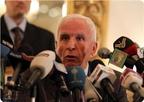
Head of the Palestinian negotiation team in Cairo and member of Fatah central committee Azzam al-Ahmad said on Friday that the Palestinian demands for a permanent truce in Gaza are indispensable and cannot be compromised, especially those related to the establishment of an airport and a seaport. Al-Ahmed said in a press conference held yesterday evening that the Palestinian delegation had been in Cairo for a whole week and no clear Israeli response had been received over the Palestinian ceasefire conditions.
He stressed that the Palestinian demands are obvious and cannot be ignored, affirming that there was an airport in Gaza, which was constructed in accordance with the Oslo accords.
"We did not ask for something new, so Israel has no right to say this or that allowed or not. We are also making demands that would lead to an end to the war," he said. "As Palestinians, we are not with the escalation but we have the right to defend ourselves."
Al-Ahmad also strongly condemned the international community for its “unfair position” towards Gaza, expressing hope that a complete ceasefire would be reached in the coming hours.
The Palestinian demands submitted to the Egyptian side briefly call for an immediate stop to Israel's military attacks on Gaza, lifting the siege, and opening the border crossings before individuals and goods.
For his part, member of Hamas’ political bureau Ezzat al-Resheq confirmed that the Palestinian delegation to Cairo has received no Israeli response on the Palestinian demands yet.
"Israel did not provide a clear response to the Palestinian people's demands," he said, holding Israel full responsibility for stalling and wasting time.
A Palestinian delegation went to Cairo a week ago to reach a ceasefire agreement with the Israelis under Egyptian mediation.
He stressed that the Palestinian demands are obvious and cannot be ignored, affirming that there was an airport in Gaza, which was constructed in accordance with the Oslo accords.
"We did not ask for something new, so Israel has no right to say this or that allowed or not. We are also making demands that would lead to an end to the war," he said. "As Palestinians, we are not with the escalation but we have the right to defend ourselves."
Al-Ahmad also strongly condemned the international community for its “unfair position” towards Gaza, expressing hope that a complete ceasefire would be reached in the coming hours.
The Palestinian demands submitted to the Egyptian side briefly call for an immediate stop to Israel's military attacks on Gaza, lifting the siege, and opening the border crossings before individuals and goods.
For his part, member of Hamas’ political bureau Ezzat al-Resheq confirmed that the Palestinian delegation to Cairo has received no Israeli response on the Palestinian demands yet.
"Israel did not provide a clear response to the Palestinian people's demands," he said, holding Israel full responsibility for stalling and wasting time.
A Palestinian delegation went to Cairo a week ago to reach a ceasefire agreement with the Israelis under Egyptian mediation.
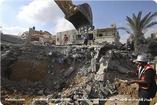
At least three dead bodies have been recovered by the Gaza rescue crews from beneath the debris of Izz al-Din al-Qassam Mosque in the Nuseirat refugee camp, in central Gaza, on Saturday while search for other dead bodies continued. A PIC correspondent said civil defense crews rushed to the bombed area to recover the casualties buried under Izz al-Din al-Qassam Mosque, razed to the ground by a barrage of rocket fire unleashed by the Israeli fighter jets at dawn Saturday.
The recovered bodied were identified as those of Mu'az Zayed, Tarek Jad Allah, and Nidhal Badran.
Al-Qassam Mosque was the largest in the Nuseirat refugee camp and built over an overall area amounting to 1000 square meters. An Israeli rocket attack reduced the four-floured mosque to rubble.
The incident occurred shortly after the 72-hour ceasefire, brokered by Egypt last Tuesday, expired.
Gaza death toll has reached more than 1,900, while the number of wounded civilians has gone up to about 9,900, mostly children, women and elderly people. Hundreds of civilian homes, mosques, factories and public headquarters were completely destroyed in Israeli attacks.
The Palestinian resistance factions have continued to launch rocket counterattacks in response to Israel's crimes against the civilians in Gaza.
The recovered bodied were identified as those of Mu'az Zayed, Tarek Jad Allah, and Nidhal Badran.
Al-Qassam Mosque was the largest in the Nuseirat refugee camp and built over an overall area amounting to 1000 square meters. An Israeli rocket attack reduced the four-floured mosque to rubble.
The incident occurred shortly after the 72-hour ceasefire, brokered by Egypt last Tuesday, expired.
Gaza death toll has reached more than 1,900, while the number of wounded civilians has gone up to about 9,900, mostly children, women and elderly people. Hundreds of civilian homes, mosques, factories and public headquarters were completely destroyed in Israeli attacks.
The Palestinian resistance factions have continued to launch rocket counterattacks in response to Israel's crimes against the civilians in Gaza.
and that they didn't even meet any one belonging to Hamas, during their stay in Gaza.
Spokesman for Israel's foreign ministry Yigal Palmor declared, "I can not believe that any veteran photographers could not succeed in taking a photo even to one group launching a missile, or one fighter from Hamas."
The journalists, near unanimously, confirmed and agreed on one thing: that they had not witnessed one scene which would serve to prove the PM’s allegations.
Friday, Hebrew daily Haaretz reported that, among the 710 journalists who entered Gaza to cover the Israeli offensive, only one correspondent (from Indian TV channel NDTV) documented resistance fighters firing rockets into Israel, adding that "similar images may be revealed later, but we met all the reporters who said that they did not notice such pictures, and if they did, they would take them."
A veteran correspondent asserted that the fact that NDTV succeeded in taking one picture does not prove anything.
Another veteran correspondent is reported to have said, "I saw a small number of Hamas fighters; they were few. This reminded me of the second Lebanon War, when I did not see Hezbollah fighters at the border area."
According to the New York Times' Anne Bernard, NYT staff simply broadcasted reports about launching rockets from populated and agricultural areas. "We saw them flying", she said, "but, within two weeks, I did not see the crews that fired rockets. They hid them for understandable reasons, in order not to be targeted by the Israeli raids."
A European photographer further backed his fellow correspondents' general assessment by stating that he did not see missile launchers anywhere but, rather, watched and photographed a lot of missiles flying in the air. The rocket launchers were hidden well, he further stated, adding that even Israel, despite all of its drones, did not find any of them.
One journalist reportedly said, “I know that some people have faced problems, but nothing more than what is expected to happen in the coverage of such a war,” stating that he did not feel as though Hamas militants threatened him any more than did the Israelis.
See also: 08/07/14 "Reporters Without Borders: Journalist Death Toll in Gaza Reaches 13"
Spokesman for Israel's foreign ministry Yigal Palmor declared, "I can not believe that any veteran photographers could not succeed in taking a photo even to one group launching a missile, or one fighter from Hamas."
The journalists, near unanimously, confirmed and agreed on one thing: that they had not witnessed one scene which would serve to prove the PM’s allegations.
Friday, Hebrew daily Haaretz reported that, among the 710 journalists who entered Gaza to cover the Israeli offensive, only one correspondent (from Indian TV channel NDTV) documented resistance fighters firing rockets into Israel, adding that "similar images may be revealed later, but we met all the reporters who said that they did not notice such pictures, and if they did, they would take them."
A veteran correspondent asserted that the fact that NDTV succeeded in taking one picture does not prove anything.
Another veteran correspondent is reported to have said, "I saw a small number of Hamas fighters; they were few. This reminded me of the second Lebanon War, when I did not see Hezbollah fighters at the border area."
According to the New York Times' Anne Bernard, NYT staff simply broadcasted reports about launching rockets from populated and agricultural areas. "We saw them flying", she said, "but, within two weeks, I did not see the crews that fired rockets. They hid them for understandable reasons, in order not to be targeted by the Israeli raids."
A European photographer further backed his fellow correspondents' general assessment by stating that he did not see missile launchers anywhere but, rather, watched and photographed a lot of missiles flying in the air. The rocket launchers were hidden well, he further stated, adding that even Israel, despite all of its drones, did not find any of them.
One journalist reportedly said, “I know that some people have faced problems, but nothing more than what is expected to happen in the coverage of such a war,” stating that he did not feel as though Hamas militants threatened him any more than did the Israelis.
See also: 08/07/14 "Reporters Without Borders: Journalist Death Toll in Gaza Reaches 13"
Page: 100 - 99 - 98 - 97 - 96 - 95 - 94 - 93 - 92 - 91 - 90 - 89 - 88 - 87 - 86 - 85- 84 - 83 - 82 - 81
Truce violations List of names Pictures of martyrs
Days: Aug: 26 - 25 - 24 - 23 - 22 - 21 - 20 - 19 - 18 - 17 - 16 - 15 - 14 - 13 - 12 - 11 - 10 - 9 - 8 - 7 - 6 - 5 - 4 - 3 - 2 - 1
July: 31 - 30 - 29 - 28 - 27 - 26 - 25 - 24 - 23 - 22 - 21 - 20 - 19 - 18 - 17 - 16 - 15 - 14 - 13 - 12 - 11 - 10 - 9 - 8
Days: Aug: 26 - 25 - 24 - 23 - 22 - 21 - 20 - 19 - 18 - 17 - 16 - 15 - 14 - 13 - 12 - 11 - 10 - 9 - 8 - 7 - 6 - 5 - 4 - 3 - 2 - 1
July: 31 - 30 - 29 - 28 - 27 - 26 - 25 - 24 - 23 - 22 - 21 - 20 - 19 - 18 - 17 - 16 - 15 - 14 - 13 - 12 - 11 - 10 - 9 - 8

